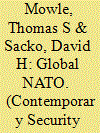| Srl | Item |
| 1 |
ID:
080323


|
|
|
|
|
| Publication |
2007.
|
| Summary/Abstract |
NATO must adapt to the structural imperatives of a unipolar world, or become
increasingly irrelevant. The Global NATO initiative of 2006 would have begun transformation
of NATO into a more flexible, effective, and legitimate organization. The
benefits of NATO globalization are greatest for the United States. Unipolarity means
Downloaded By: [Inst for Defence Studies & Analysis] At: 07:12 18 February 2008
that the United States does not need allies to ensure its security, but the United States
nevertheless receives value from the existence of a pool of capable states whose
equipment and training allow them to operate together. Unipolarity means that
other states will be more likely to bandwagon with the United States than to
balance against it; laundering that cooperation through an institution can enhance
those other states' influence. A NATO expanded to include states that share
common interests with the United States, acting in more flexible coalitions rather
than always as a whole, would meet these goals. It would also be more effective
and legitimate as an organization, since it would include greater military resources
from a more diverse collection of countries
|
|
|
|
|
|
|
|
|
|
|
|
|
|
|
|
| 2 |
ID:
072903


|
|
|
|
|
| Publication |
2006.
|
| Summary/Abstract |
Militias in Iraq were not effectively demobilised or disarmed because the American occupation forces did not apply lessons from previous experience. The United States did not develop a comprehensive plan for addressing all armed groups, but tried to disarm groups before a full political settlement was reached and accepted, and did not include a neutral arbiter such as the United Nations. Militia disarmament thus failed in Iraq. The failure to apply lessons from the past was compounded by the fact that demobilisation was attempted in a situation where no group fully accepted either the occupation government or the nascent Iraqi state. This failure allowed Iraqi security institutions to be infected by paramilitary groups, heightening the extent of civil conflict.
|
|
|
|
|
|
|
|
|
|
|
|
|
|
|
|